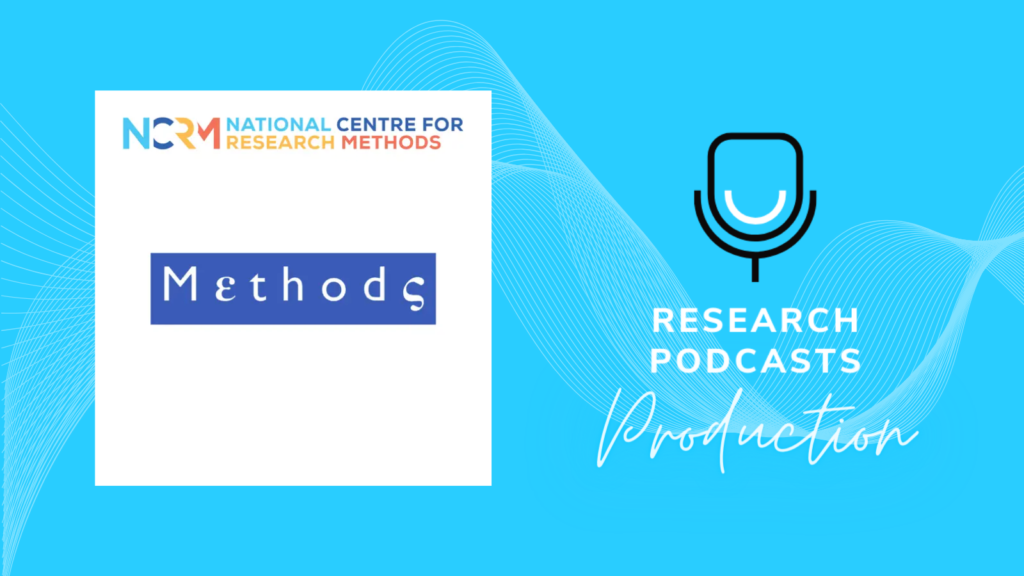
Throughout August we will be throwing a spotlight on our podcast productions from the 2022/23 academic year, starting with Methods produced in collaboration with National Centre for Research Methods (NCRM).
In the latest series of Methods, our Senior Producer Catherine McDonald spoke to 6 experts on all things research methods, gaining their insight on generalizability, ethical dilemmas, writing up and their advice for early career researchers. As part of the EU-funded YouthLife Project this series aims to understand how researchers can do better longitudinal research on youth transitions.
Kickstarting the series, Catherine spoke with Johnny Saldana (Professor Emeritus from Arizona State University’s School of Film, Dance and Theatre) about qualitative longitudinal research. Johnny emphasised the importance of researchers being well versed in many methodologies so the most appropriate for the individual study can be selected rather than being pigeonholed into just one approach.
“Quantitative provides us with that evidentiary rigour, it provides us with statistical persuasion. Qualitative inquiry brings to the research enterprise insightful, and I think revelatory guidance for the human condition. So rather than thinking that each paradigm has its own weaknesses, that combining them if you will, fulfils or cancels each other out. Instead, think of the strengths that each paradigm brings to the research project, when you combine and merge them together.”
Johnny Saldana, Methods (Oct. 2022)
In the next episode Catherine spoke with Jane Gray (programme leader for the Irish Qualitative Data Archive) on her interest in how individual experience and wider social change intersect. When asked what advice she would give her younger self as a researcher she said
“I would have been much more strategic about the places that I studied, the time period that I studied, the connections that I made in my career in terms of who I was working with, because all of those things are really important if your main goal is to be really successful, as a scholar”.
Jane Gray, Methods (Nov. 2022)
In episode 3 Catherine spoke to Dan Woodman (Associate Professor of Sociology at the School of Social and Political Sciences at the University of Melbourne) about the importance of iterative models in longitudinal research and how reciprocity can help keep study participant engaged and prevent attrition.
Dan’s advice for researchers is that
“Recognising your limits and recognising and respecting and bringing your strengths to a team project where you can draw on the strengths of others is a great way to make academic life less isolating. In my case, I think more enjoyable.”
Dan Woodman, Methods (Jan. 2022)
Episode 4 saw Laura Camfield (Professor of Development, Research and Evaluation at the School of International Development at the University of East Anglia) discuss the opportunities and challenges posed by cross national mixed method research.
She advises against biting off more than you can chew arguing that “less is more” when it comes to a cross country study. Her advice to future researchers is to have a clearly identified gap in the literature and purpose of the data collection from the outset to avoid challenges in the writing up process.
“Actually, if we thought from the outset, we really want to write this sort of paper, what do we need to have to make it credible to the kind of audiences that we’re going to be aiming for, if we put a bit more thought in at the outset, we wouldn’t have had that problem at the end.”
Laura Camfield, Methods (Feb. 2022)
Catherine discussed how qualitative research can add nuance to theory with JD Carpentieri in episode 5. JD is Associate Professor of Social Science and Policy in the Department of Education, Practice and Society at University College London, and an Honorary Research Associate at the Centre for Longitudinal Studies.
JD discussed how actively involving the participant in the research helps to prevent attrition;
“They very often talk about how they feel that by being part of the study, they’re making a small but meaningful contribution to the world. And I think that then benefits me as a researcher, because they’re more likely to stay in my study.”
JD Caarpentieri, Methods (Mar. 2022)
The series rounded off with Catherine speaking to Laura Bernardi, Professor of Demography and Sociology of the Life Course within the LIVES Centre at the University of Lausanne. Laura discusses mixed methods and the importance of the right research questions to match the aims of longitudinal research.
Ending the series on a positive note, Laura says
“the only thing I could tell to my early career version would be ‘good choice’.”
Laura Bernardi, Methods (Apr. 2022)
The Methods podcast is produced by NCRM in collaboration with Research Podcasts.
If you are interested in our production services contact our Managing Director, Chris Garrington, for more information at Chris@researchpodcasts.co.uk.
Research Podcasts offer podcast consultancy, production and training for researchers and academics. Check out our various training workshops including an introduction to podcasting workshop, how to launch your podcast and our more advanced courses on podcast presenting, podcast editing, and how to build a podcast brand.
Freya Peake, Research and Administration Assistant at Research Podcasts